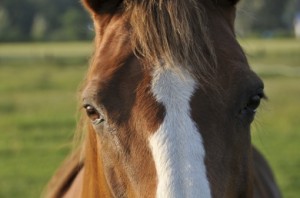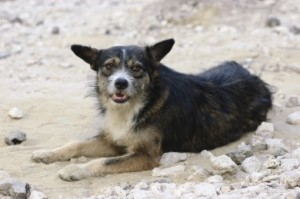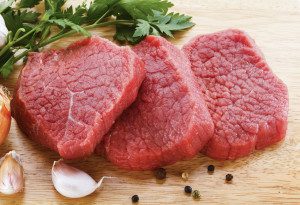Worldlog Semaine 14 – 2014
La semaine dernière nous avons entendu dire que Eyes on Animals (une organisation d’inspection pour les animaux agricoles) a fait une recherche à l’origine de la viande de cheval qui est vendue dans les supermarchés néerlandais. Les résultats de ces enquêtes sont choquants. Il se révèle que beaucoup de viande de cheval des magasins néerlandais vient des chevaux qui sont abattus en Amérique du Nord et en Amérique du Sud et qui y sont très gravement maltraités. Aussi nous avons demandé un débat concernant ce sujet et la majorité a supporté cette demande.
Pendant deux ans de différents abattoirs, ventes aux enchères de chevaux et transports de chevaux aux Etats-Unis, au Mexique, au Canada et en Argentine ont été inspectés par Eyes on Animals. La viande de ces chevaux est exportée à grande échelle aux Pays-Bas. Pendant les transports qui durent parfois 36 heures les chevaux n’ont pas ou presque pas d’eau, de nourriture et de repos… Les bétaillères bondées avec des chevaux crevés, blessés et maigres ne sont pas une exception.
Les inspecteurs ont vu comment les chauffeurs ont battu des chevaux tombés avec des barres de métal ou des bâtons électriques pour les faire remonter. Les poulains ont été piétinés par les chevaux adultes et se sont blessés gravement ou sont décédés lentement. Les animaux ont été transportés dans les conditions météorologiques extrêmes. Ainsi les chevaux ont été transportés dans les bétaillères sans toit pendant une chaleur désertique. Nous voulons une défense d’importation de la viande de cheval venant des Etats-Unis, du Mexique, du Canada et d’Argentine!
La semaine dernière j’ai posé des questions à l’Assemblée nationale néerlandaise concernant la chasse de primes aux chiens errants en Roumanie. Vendredi dernier une clinique de chiens a été dévalisée par des chasseurs de primes, parce que le gouvernement roumain donne de l’argent pour chaque chien attrapé. Nous voulons que le gouvernement néerlandais pousse le gouvernement roumain d’arrêter le système où l’on récompense les gens qui attrapent et tuent les chiens errants.
Le gouvernement roumain continue à encourager les gens à tuer les chiens errants en leur donnant une récompense de 50 euros par chien tué. C’est inacceptable que le gouvernement roumain encourage ses citoyens à attraper et tuer les chiens par un système sadique de récompense. Une telle attitude cruelle envers les animaux errants est insupportable dans un Etat membre de l’Union européenne. Je veux que le gouvernement néerlandais pousse le gouvernement roumain d’arrêter la politique cruelle aux chiens errants et de remplacer le système de récompense par un système où les animaux sont attrapés, stérilisés et replacés.
Fin septembre la Cour Constitutionnelle roumaine a approuvé une loi qui mène maintenant à un massacre parmi les trois millions de chiens qui vivent en Roumanie. La nouvelle loi accepte que les chiens errants sont tués après un séjour de quinze jours dans le refuge quand il n’y a pas assez de places pour garder les chiens ou quand il y a un manque de nourriture ou de soins médicaux. En ce moment les chiens sont tués en masse. Et il faut en mettre fin!
La semaine dernière j’ai également posé des questions pendant le top nucléaire à La Haye concernant le service de la viande originaire des animaux qui ont été abattus sans anesthésie. De la viande halal ferait partie du déjeuner offert aux chefs de gouvernement, selon le chef traiteur pendant un interview sur Radio1.
Je veux que le gouvernement explique si cette viande est originaire des animaux abattus sans anesthésie. Personne ne devrait avoir de la viande des animaux abattus sans anesthésie sans en avoir demandé. Il faut mettre fin le plus vite possible à l’abattage rituel sans anesthésie et jusqu’au moment où ce n’est pas encore interdit, les consommateurs – dans ce cas les participants au top – doivent être informés du fait que l’on offre de la viande des animaux abattus rituellement sans anesthésie.
Voici un court métrage qu’il faut vraiment voir pour commencer la semaine:
752 Rescued Hens Feel Sunshine for the First Time
Un conseil pour ceux qui pensent que l’économie est plus importante que l’écologie.
A bientôt!
Last week, it was in the news that Eyes on Animals (Inspection Organisation for Farm Animals) conducted an investigation into the origin of horse meat sold in Dutch supermarkets. The results of this investigation are shocking. Much of the horse meat sold in Dutch shops is from horses that are slaughtered in North and South America, and which are seriously mistreated. We asked for a debate on this subject and a majority has supported our request.
For two years, Eyes on Animals inspected various horse auctions, slaughterhouses and horse transportations in the United States, Mexico, Canada and Argentina. The meat of those horses is exported to the Netherlands on a large scale. During these transports, which sometimes take up to 36 hours, the horses get no or hardly any water, food or rest. Overcrowded cattle trucks with exhausted, injured and starved horses are no exception.
Inspectors could see how the drivers hit horses, which had fallen, with iron bars and electric sticks to get them up again. Foals were trampled by adult horses and were severely injured or died slowly. The animals were transported under extreme weather conditions. For example, horses were transported during severe desert heat in cattle trucks with no roofs. We want to ban the import of horse meat from the United States, Mexico, Canada and Argentina!
I asked Parliamentary questions last week about the premium hunting for stray dogs in Romania. Last Friday, premium hunters stole all the dogs from a dog clinic in Romania because the Romanian authorities pay money for each dog that is caught. We want the Dutch government to urge the Romanian authorities to stop the system where people are rewarded for catching and killing stray dogs.
The Romanian authorities keep encouraging the killing of stray dogs with a remuneration system where they reward an amount of 50 euros for each dog killed. It is unacceptable that the Romanian Government encourages its civilians with a perverse remuneration incentive to catch and kill dogs. Such a cruel attitude towards stray animals is unacceptable in a Member State of the European Union. I want the Dutch government to urge the Romanian government to stop its cruel stray dog policy using a remuneration system and to change their policy into one of providing shelter, neutering and returning them.
Late September last year, the Romanian Constitutional Court approved an act that now leads to a mass slaughter among three million stray dogs living in Romania. The new Act allows the killing of stray dogs after they have been in a shelter for fourteen days, or if there is not enough room to keep them in the shelters, or if there are no means for sufficient food or medical care. Dogs are killed en masse. This has to stop!
I have also asked Parliamentary questions about the meat that was served during the Nuclear Security Summit in The Hague last week, which was apparently from ritually slaughtered animals. According to the main caterer in an interview on Radio1, halal meat was part of the lunch served to the government leaders.
I want to hear from the parliament if this meat was from animals that were slaughtered without sedation. Nobody should be served meat from ritual slaughter without particularly asking for it. Ritual unsedated slaughtering should be put to an end as soon as possible and for as long as it is not banned, consumers – in this case the participants to the Summit – should be informed of the fact that they are served meat from unsedated ritual slaughter.
You should start your week with this small film:
752 Rescued Hens Feel Sunshine for the First Time
Tip for anyone who thinks that economy is more important than ecology.
Until soon!


